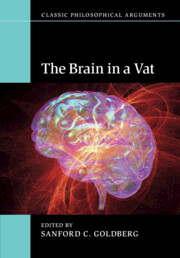Book contents
- Frontmatter
- Contents
- List of contributors
- Acknowledgments
- 1 Introduction: Putnam's reflections on the brain in a vat
- Part I Intentionality and the philosophy of mind and language
- Part II Epistemology
- Part III Metaphysics
- 9 Brains in vats and model theory
- 10 Realism, skepticism, and the brain in a vat
- 11 Rethinking semantic naturalism
- 12 Internal to what? Contemporary naturalism and Putnam's model-theoretic argument
- 13 The model-theoretic argument: from skepticism to a new understanding
- 14 Eligibility and ideology in the vat
- Bibliography
- Index
14 - Eligibility and ideology in the vat
from Part III - Metaphysics
Published online by Cambridge University Press: 05 June 2016
- Frontmatter
- Contents
- List of contributors
- Acknowledgments
- 1 Introduction: Putnam's reflections on the brain in a vat
- Part I Intentionality and the philosophy of mind and language
- Part II Epistemology
- Part III Metaphysics
- 9 Brains in vats and model theory
- 10 Realism, skepticism, and the brain in a vat
- 11 Rethinking semantic naturalism
- 12 Internal to what? Contemporary naturalism and Putnam's model-theoretic argument
- 13 The model-theoretic argument: from skepticism to a new understanding
- 14 Eligibility and ideology in the vat
- Bibliography
- Index
Summary
Introduction
Lewis's reference magnetism is meant to address worries raised by Putnam's anti-realist model-theoretic argument (MTA). I won't try to determine whether it succeeds in that regard. But suppose – as many contemporary metaphysicians do – that it does succeed. Putnam's got another argument. Putnam's brain-in-a-vat argument (BVA) is not just another attempt to respond to Cartesian skepticism. It is also, like the MTA, an attack on realism. And because the brain-in-a-vat argument proceeds on the basis of different – and more conservative – assumptions about the nature of reference, a solution to the MTA does not automatically extend to the BVA. So: if we suppose that reference magnetism succeeds in addressing the worries raised by the MTA, what should we think of its prospects for mounting a response to the BVA? I argue that the metaphysical realist does have a response to the BVA. That response, however, is importantly different from what the realist might have thought going in. I argue that the realist should insist on a distinction between a theory's truth and its overall epistemic success. In turn, the realist can maintain that there are genuinely radical yet non-self-refuting skeptical hypotheses, but that such hypotheses concern not the truth of a theory but a different aspect of epistemic success, namely the fundamentality of its ideology. Such a response is consistent with the conclusion of the BVA. Nevertheless, it deprives that argument of its anti-realist force. The view I suggest thus makes theoretical space for the semantic considerations Putnam brings to bear while preserving the spirit of the metaphysical picture he attacks.
Magnets and model theory
Reference magnetism is the view that part of what determines the meanings of our terms is the objective metaphysical naturalness of the properties and relations to which we refer. Lewis introduces the view (though not under that name) in the context of arguing that there is a great deal of philosophical work to be done by such a notion of naturalness – by the notion that the world contains metaphysical joints the location and nature of which are independent of us and our theorizing (Lewis 1983b). The world can be carved up in all kinds of ways. But Lewis argues that some ways of carving the world are objectively, metaphysically, more natural than others.
- Type
- Chapter
- Information
- The Brain in a Vat , pp. 226 - 250Publisher: Cambridge University PressPrint publication year: 2016
- 4
- Cited by



